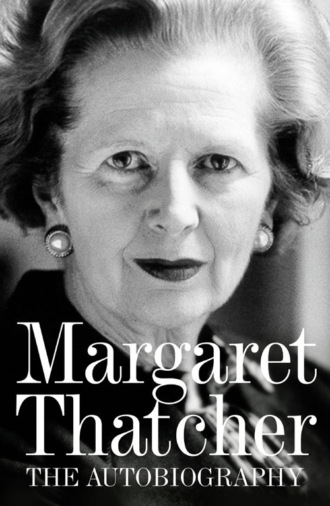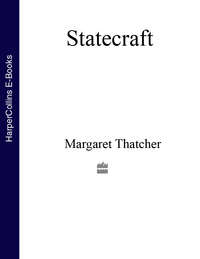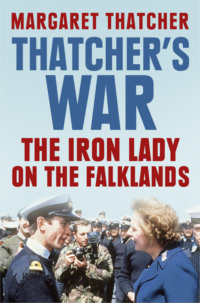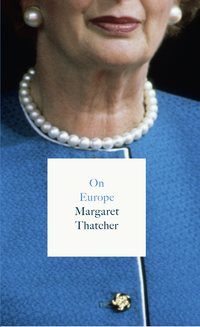
Полная версия
Margaret Thatcher: The Autobiography
Finchley had been run with a degree of gentlemanly disengagement that was neither my style nor warranted by political realities. I intended to work and then campaign as if Finchley were a marginal seat, and I hoped and expected that others would follow my lead. From now on I was in the constituency two or three times a week and regularly went out canvassing in each of the wards, returning afterwards to get to know the Party activists over a drink in the local pub or someone’s house.
By the time I arrived as candidate, there was a good deal of concern that the Liberals in Finchley were becoming strongly entrenched. They were always excellent campaigners, particularly effective in local government elections. A few years before, there had been a famous local scandal over the barring of Jews from membership of Finchley Golf Club, in which a number of local Conservatives had been involved: the Liberals never missed an opportunity to remind people of it. I simply did not understand anti-semitism myself, and I was upset that the Party should have been tainted by it. I also thought that the potential Conservative vote was not being fully mobilized because of this. So I set out to make it absolutely clear that we wanted new members, especially Jewish Conservatives, in our branch organizations. Though I did not know it at the time, I was subsequently to find some of my closest political friends and associates among Jews. What was clear was that the potential Conservative vote was not being fully exploited, and that however many feathers might be ruffled in the process it was vital to strengthen our branch organization. I also put a good deal of effort into strengthening the Young Conservative organization in the constituency: I was sure that it was by attracting energetic young people that we could most surely resist the challenge of activist Liberals. By the time the election was called in September 1959 the constituency organization was looking in better shape, and I had begun to feel very much at home.
My first general election polling day in Finchley in October 1959 was very much to set the pattern for the nine such polling days which would succeed it. Soon after the opening of the poll I would vote in my own home constituency – Orpington in 1959, Chelsea and Westminster in later elections – and then drive up to Finchley with Denis. I visited each of the polling stations and our committee rooms, breaking for lunch with Bertie Blatch and others in a hotel. There I rigorously paid just for my own food and drink, to avoid the accusation of ‘treating’ electors, terror of which is instilled by Conservative Central Office into all our candidates. From 5 o’clock I carefully avoided visiting committee rooms, which should all be sending out workers to summon our supporters to the polls, just dropping into a polling station or two to show the flag. Then at close of poll Denis and I went to the Blatches’ for something to eat, visited the constituency offices to catch the latest largely anecdotal news, and finally attended the count – on this occasion at Christ’s College, though later all nine constituency counts would be held at Barnet Town Hall.
At the school, I found that each of the candidates had been allocated a room where he or she with a select band of supporters could get something to eat and drink and where we had access to that miracle of modern political life – a television. The 1959 campaign had, in fact, been the first in which television played a serious part. I divided my time between watching the growing piles of ballot papers, candidate by candidate, on the long tables in the body of the hall, and slipping back to my room to catch the equally satisfactory results coming in across the country as a whole.
At about 12.30 a.m. I was told that the Finchley results were shortly to be announced, and was asked to join the Electoral Returning Officer with the other candidates on the platform. Perhaps some people in a safe seat when the Tories were on course for a national victory would have been confident or even complacent. Not me. Throughout my time in politics, whether from some sixth sense or perhaps – who knows? – from mere superstition, I have associated such attitudes with imminent disaster. So I stood by the side of Denis with a fixed smile and tried not to look as I felt.
The Returning Officer began: ‘Deakins, Eric Petro: thirteen thousand, four hundred and thirty-seven.’ (Labour cheers.) ‘Spence, Henry Ivan: twelve thousand, seven hundred and one.’ (Liberal cheers.) And finally we reached: ‘Thatcher, Margaret Hilda: twenty-nine thousand, six hundred and ninety-seven.’ I was home and dry – and with a majority of 16,260, almost 3,500 more than my predecessor. The cheers rose. I made my short speech of acceptance, thanked all my splendid helpers, received a warm hug from Denis and walked down from the platform – the elected Member for Finchley.
In an unguarded moment, shortly after I had been selected for Finchley, I had told the twins that once I became an MP they could have tea on the terrace of the House of Commons. From then on the plaintive request had been: ‘Aren’t you there yet, Mummy? It’s taking a long time.’ I had known the feeling. It had seemed so very long for me too. But I now knew that within weeks I would take my seat on the green leather benches of the House of Commons.
It was the first step.
* A.V. Dicey, jurist (1835–1922).
Конец ознакомительного фрагмента.
Текст предоставлен ООО «ЛитРес».
Прочитайте эту книгу целиком, купив полную легальную версию на ЛитРес.
Безопасно оплатить книгу можно банковской картой Visa, MasterCard, Maestro, со счета мобильного телефона, с платежного терминала, в салоне МТС или Связной, через PayPal, WebMoney, Яндекс.Деньги, QIWI Кошелек, бонусными картами или другим удобным Вам способом.





